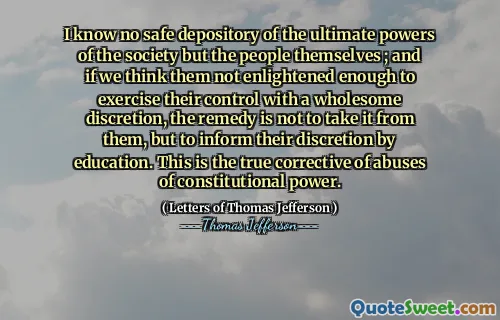
Earthquake means destruction; dictator means destruction! In the case of earthquake, you need a strong building; in the case of dictator, you need an educated rational mind, because an irrational ignorant mind always serves the dictator!
This quote draws a compelling parallel between natural disasters and political tyranny, emphasizing the type of resilience required to withstand each. Earthquakes, inevitable forces of nature, can cause considerable destruction, but their impact can often be lessened through physical preparations — such as constructing strong and earthquake-resistant buildings. This metaphor underscores an important lesson about how we respond to external, unavoidable threats: preparedness through tangible strength and fortitude can mitigate damage.
However, the comparison deepens when it shifts focus from a natural disaster to the human-made devastation wrought by dictatorships. Unlike earthquakes, dictatorships thrive and persist not due to uncontrollable external forces but because of internal societal vulnerabilities. The quote suggests that the greatest defense against dictatorship does not come from physical strength but from the strength of the society's collective mind — rationality and education.
An "educated rational mind" is presented as the keystone of resistance against dictatorship. This idea implies that dictatorships flourish only when individuals surrender their critical thinking and allow ignorance and irrational beliefs to dictate their actions. It is a reminder that tyranny is sustained not only through coercion but through the complacency and unawareness of the populace.
The call here is both philosophical and practical: fostering education, critical thinking, and rational discourse within society is an essential bulwark against tyrannical rule. It also highlights the significance of individual responsibility — that every person must actively engage with knowledge and reject blind ignorance to protect freedom and democracy.
In essence, the quote compels us to consider the nature of defense beyond the physical realm. While external disasters require structural resilience, internal threats necessitate cognitive resilience. It underscores the power of intellect as a tool to counteract the damage of entrenched political oppression. This message is ever-relevant in a world where misinformation, propaganda, and authoritarian tendencies continually challenge enlightened governance and individual liberty.
The poignancy of this quote lingers because it links the literal, visible damage caused by earthquakes with the metaphorical, often invisible damage caused by oppressive leadership. It encourages preparation on both physical and intellectual fronts — to build not only stronger buildings but also stronger, wiser minds.











